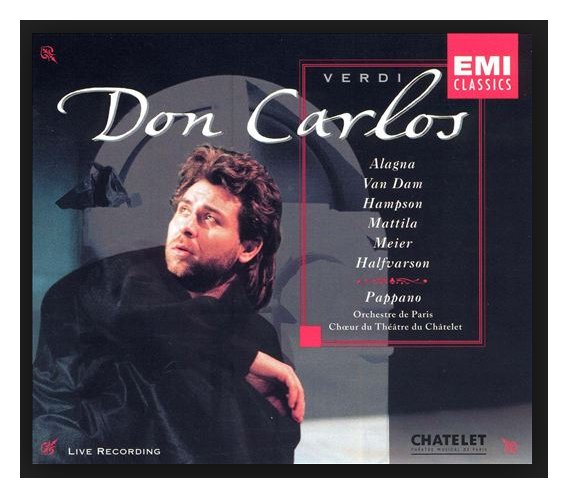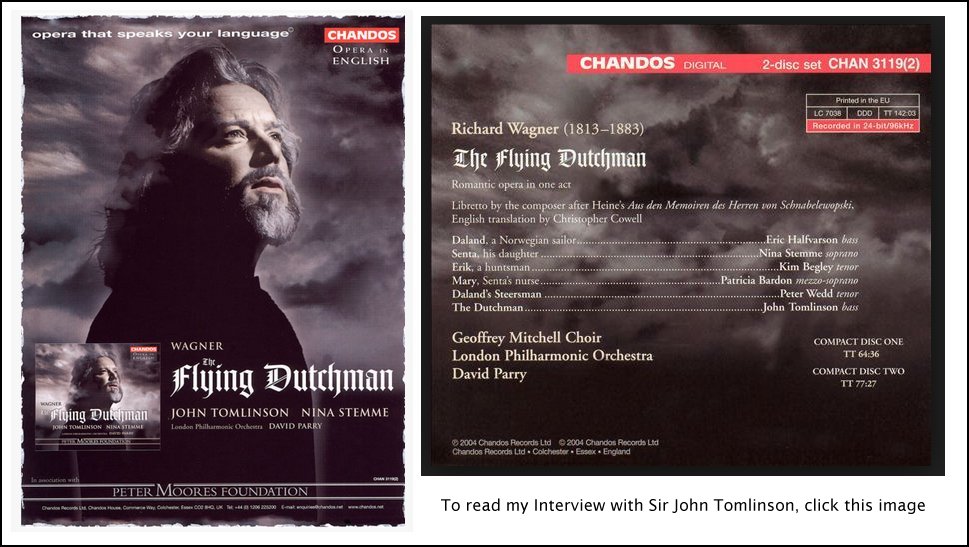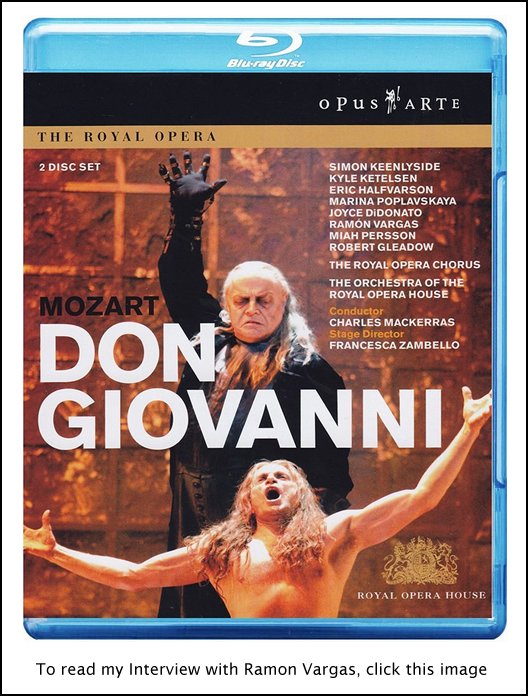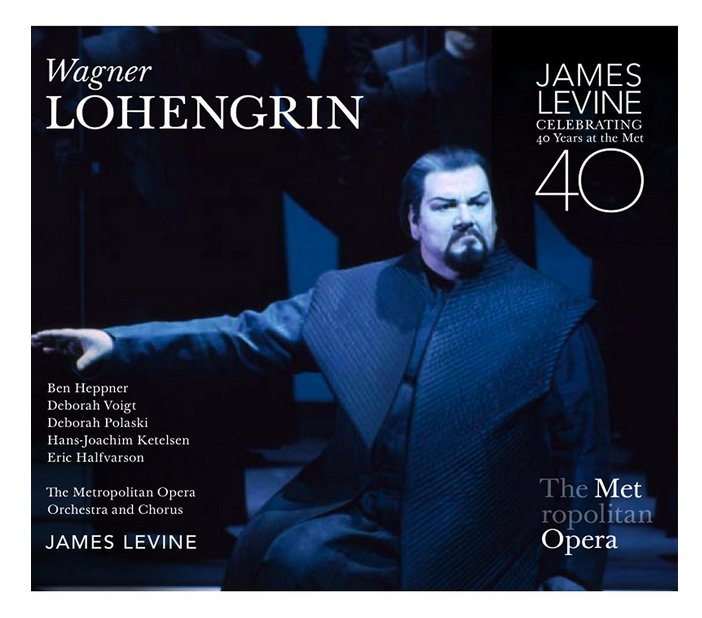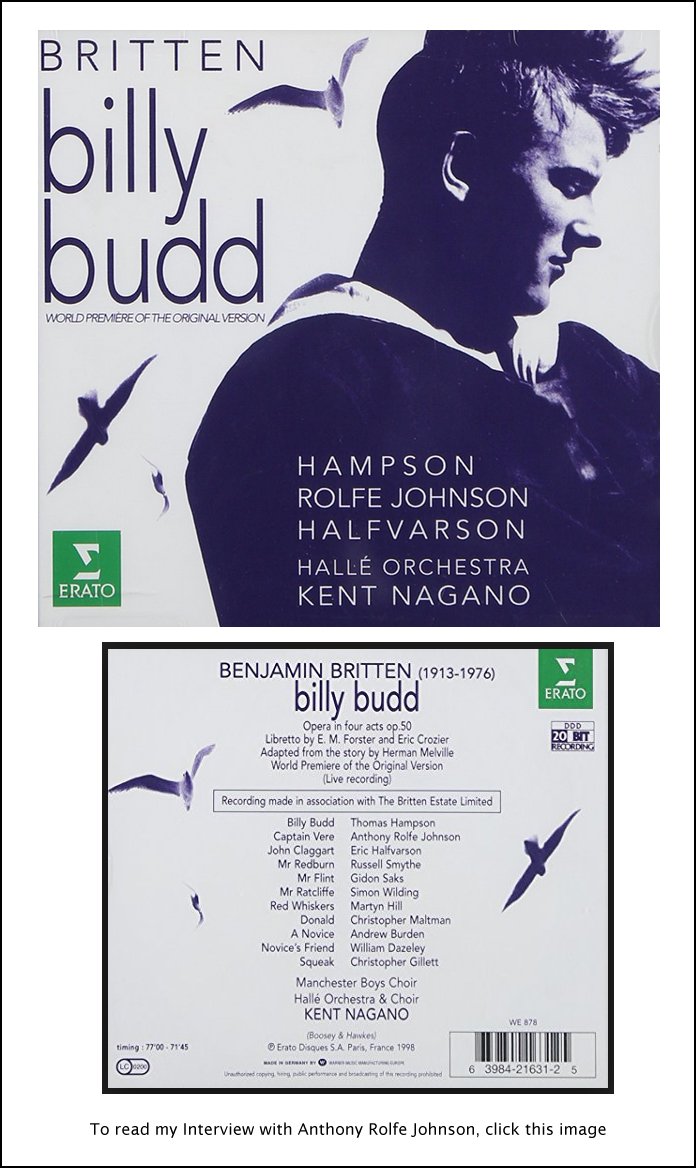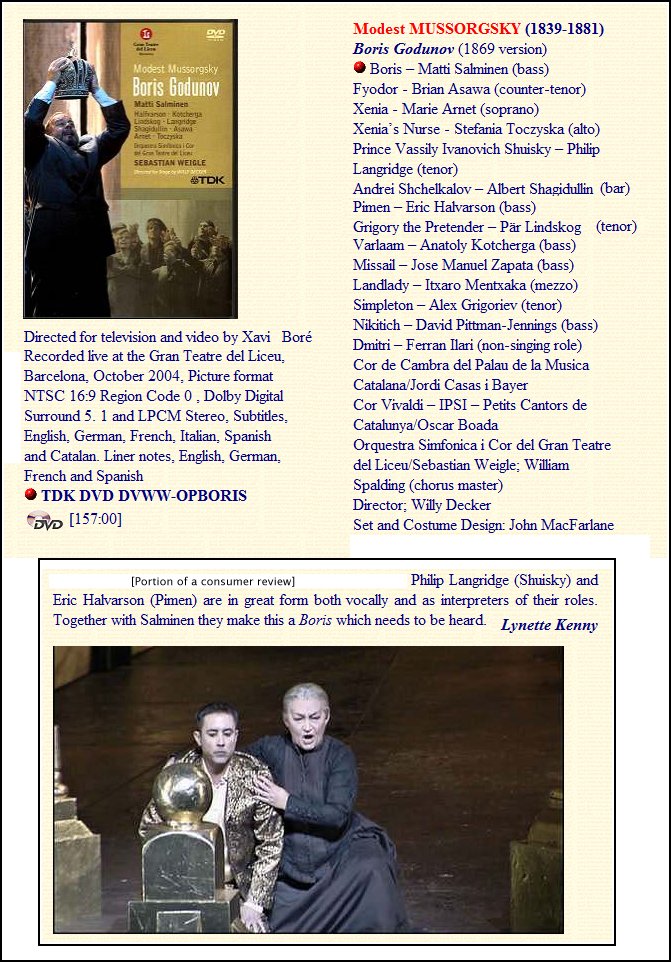[Note: This interview first appeared in The Opera Journal in September,
1996.]
Conversation Piece:
Bass ERIC HALFVARSON
By Bruce Duffie
After a number of years doing leading bass roles in the U.S. and
Europe, Eric Halfvarson is making his move to even wider fame. Known
for
Ochs in
Der Rosenkavalier and Sarastro in The Magic Flute,
he has recently been turning up in major productions of The Ring
including the stagings at Bayreuth and Chicago.
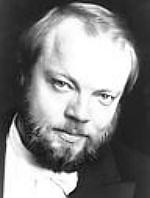 Besides
the many operas, Halfvarson makes time each season for some concerts
including
the Missa Solemnis and Ninth Symphony of Beethoven, the
C
Minor Mass of Mozart, and recently the Mahler
8th with the Chicago
Symphony Orchestra. He returns to the Windy City in September for the
Opening
Night Don Carlo.
Besides
the many operas, Halfvarson makes time each season for some concerts
including
the Missa Solemnis and Ninth Symphony of Beethoven, the
C
Minor Mass of Mozart, and recently the Mahler
8th with the Chicago
Symphony Orchestra. He returns to the Windy City in September for the
Opening
Night Don Carlo.
It was in 1995 that Halfvarson was in Chicago for both Fafner in
Siegfried
and Don Basilio in Rossini's The Barber of Seville. During that
period, I had a chance to chat with him, and here is much of what was
said...
Bruce Duffie: Do you like the life of a wandering singer?
Eric Halfvarson: Well, my God, that's a difficult question
to start out with. Yes and no. For a long time, it was quite solitary,
and I came to the conclusion that it would be more or less impossible
to
sustain a personal relationship the way I thought it ought to be done,
and be an absentee partner. Then in 1990, I met my wife in Dallas and
she
convinced me that I was wrong. Now we travel together 90% of the time.
BD: If she can travel with you, that would be ideal.
EH: That was the original idea, but the economy makes it
increasingly
difficult. Basses, you might be interested in knowing, don't make the
salary
that leading tenors and sopranos make. So we make some adjustments.
BD: Should the bass be paid the same as the tenor and the
soprano?
EH: I suppose not. It's impossible to imagine that Friar
Laurence
would get the same as Romeo and Juliet.
BD: But shouldn't Philip II get the same as Don Carlo and
Elisabeth?
EH: In that particular opera, perhaps, and in some houses
there is more of an equality being established. But the reality is that
a certain few individuals make an enormous amount, and the rest
of us are getting by. It's difficult.
BD: Now without getting into specifics, does the amount of
payment depend on the length of the role?
EH: Oh yes, usually. Also the amount you've been
spending
on PR has something to do with it. But that's kind of a touchy subject.
* *
*
* *
BD: I want to talk mostly about vocal artistry. You are a
bass and your voice dictates which roles you will sing. Are you pleased
with these roles, or would you rather be the romantic lead?
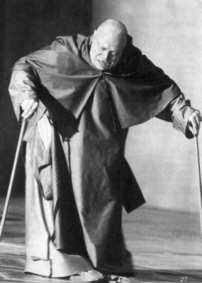 EH:
There's something about the character of a personality that goes
(usually)
right along appropriately with the voice-type. I enjoy being fathers
and
priests and bad guys, and occasionally funny guys. In my younger days,
I did Mozart's Figaro a lot, and that's the only one I can think of
offhand
where the bass actually does get the girl. Nowadays I've been doing an
awful lot of bad guys, particularly in Bayreuth where I do Hagen. He's
one of my favorites because I get to kill both the tenor and the
baritone!
I feel a certain justice in that one. But it's been a great deal of fun
to go back to my old friend Don Basilio here in Chicago. I hadn't sung
him since '87, and I'm having a glorious time being very silly on the
great
stage.
EH:
There's something about the character of a personality that goes
(usually)
right along appropriately with the voice-type. I enjoy being fathers
and
priests and bad guys, and occasionally funny guys. In my younger days,
I did Mozart's Figaro a lot, and that's the only one I can think of
offhand
where the bass actually does get the girl. Nowadays I've been doing an
awful lot of bad guys, particularly in Bayreuth where I do Hagen. He's
one of my favorites because I get to kill both the tenor and the
baritone!
I feel a certain justice in that one. But it's been a great deal of fun
to go back to my old friend Don Basilio here in Chicago. I hadn't sung
him since '87, and I'm having a glorious time being very silly on the
great
stage.
BD: Is it very difficult to move from the declamatory
style
of Wagner to the recitative style of Rossini?
EH: Yes. It's been an interesting combination because the
schedule has been quite tight. Doing two shows together is hard anyway.
I'm an American singer, so I can sing in five languages, but in recent
years I've had a lot of success in German parts. I've done three
or four of the Strauss characters, and almost all of the big Wagner
bass
guys, and so a lot of people have begun to type-cast me into that
particular
repertoire. I'm delighted to sing in Italian because when I was growing
up, my ideal was to be an Italianate basso cantante and do
Philip
II, Guardiano, Zaccaria and all those lovely singing parts in the Verdi
repertoire. Until this season, I hadn't sung in Italian for more than
two
years. Recently I did Sparafucile at the Met, and now the Basilio, so
it
was a bit of an adjustment to go into the Italian language, and the
pitter-patter
of Rossini. Of course, that's not such a challenge as Basilio.
Bartolo
has all the famous patter. Basilio is still considered part of
the
"serious bass" fach. I'm having a good time.
BD: We've talked a bit about style. Do you adjust your
vocal
technique for the size of the house?
EH: I have a sense of acoustics in my own work. I'm a
person
who listens and I have a technique of understanding the acoustics of
the
particular situation and adjusting a little bit to it. That
doesn't
mean that I sing softer for a smaller house. Sometimes smaller houses
have
much drier acoustics and you have to work that much harder to make
things
clear. Chicago is one of the most frightening-looking houses of any
that
I've been in. There's that long, extended proscenium on both sides, and
it's long and deep and high. From the point of view of the stage, it
looks
just like the Grand Canyon. Standing on the stage of the Met, even
though
there are a few more seats, it's not as intimidating because the
balconies
are a bit closer to you. But the acoustics here in Chicago are superb,
so it's not necessary to work harder to try and fill up this place. If
a voice is well-focused, you can do wonderful pianissimos that will
sail
through into the house. It's a marvelous acoustic. I'm from Aurora,
which
is a near-west suburb of Chicago, and when I went to the University of
Illinois in Champaign-Urbana, I used to come here with a group every
Friday,
so I've heard quite a lot of operas here.
BD: Does that give you a sense of satisfaction to now be
singing
on that stage?
EH: I feel like I've been part of this family for a long
time.
As a student, I came up for the Metropolitan Auditions of the Air and
won
second place one year. They were very nice - sort of patted me on the
head
and told me to go home and grow up. It takes a bass longer than any
other
voice type to mature. I knew I'd eventually do Philip II, and
started
learning the aria at age 19, even though I knew I wouldn't do the role
until age 35 or so. Now I'm 43 and well into the main stream. But it is
a wonderful feeling to stand on this stage.
BD: Do you like being part of the international community
of opera singers?
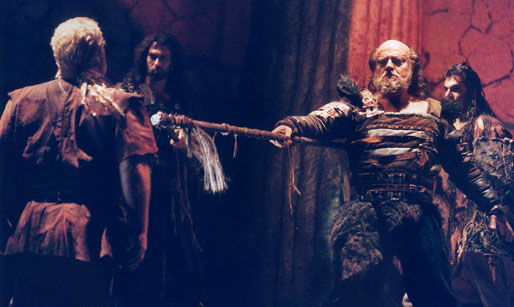
Halfvarson as Hunding in Die Walküre in
Dallas
EH: Oh very much. It's a wonderful camaraderie. Its a
relatively
small family, especially when you get into the Wagnerians. There's only
about 2 1/2 casts of the Ring in the world, and we kind of mix
around
the arrangements from one city to another, but generally you keep
running
into the same people all the time. It's a wonderful kind of warm and
supportive
atmosphere in our relationships and a rather nice consolation against
our
otherwise pretty solitary lives.
* *
*
* *
BD: Is there any competition amongst basses?
EH: Oh very little. For a long time, some of us have joked
about the "Fraternal Order of Basses." There are so few of us around
that
generally there is enough work for everybody. All the basses I know are
friends of mine. We communicate, but we hardly ever actually work
together
because there's usually only one basso in the cast.
BD: As I said before, your voice dictates the roles you
will
sing. When you're offered a role, how do you decide whether to say yes,
or no, or perhaps later but not now?
EH: For the most part it's not a problem because the
repertoire
is set out for you and you become familiar with it over years. Only now
am I getting to the last reaches of my life's work where I may question
whether or not I will ever do Hans Sachs, for example. I've done
Pogner,
but there are a few dream parts that I've not had an opportunity to do.
Boris is one, and I've not done Pimen. But I have a good knack for the
Russian language. I've done Galitzky and Konchak in Prince Igor,
I've done Gremin in Eugene Onegin several limes. It's nice to
come
in, sing the aria and leave, But I'm fascinated with repertoire. I'd
like
to do more recital work and get into the Michelangelo Songs of
Shostakovich.
So I will pursue that into the next decade.
BD: How do you divide your career between concerts and
operas?
EH: Presently I'm doing mostly opera. Recitals are
something
new I'm going to try and bring in during the next few years as time is
available. The roles get bigger and harder. I'm working now on
Gurnemanz
which is perfect for me and feels wonderful. I just need an opportunity
that is set far enough in advance that I will be sure to have finished
learning the part by then. I've turned it down about four times already
because I just haven't had the time to finish it. Then I'll be happy
having
done just about everything I can do.
BD: Is there something special about how Wagner wrote for
the voice in general and the bass voice in particular?
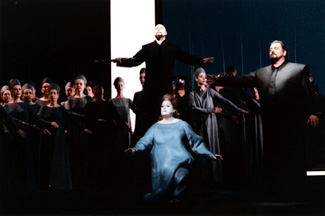
Halfvarson (center) as King Henry in Lohengrin
at the Met
with Deborah Voigt, Deborah Polaski and Ben Heppner
EH: It's very Italianate like the basso cantante
actually,
particularly in these parts like Gurnemanz. It's like a voice lesson.
Wagner
was very wise about how he wrote for the voice. It's absolutely
beautiful
to sing. He created a lower version of the "Verdi Baritone" called the
"German Bass-Baritone" and it's really difficult to find the right
voice
for it. Wotan and the Wanderer are the main examples. Some have
suggested
that I learn those parts, and that's where it becomes a hard call. I
have
to try some of it and see how it feels under difficult conditions. The
high notes are there, but it's a matter of tessitura - the amount of
time
during a piece that you spend up there. Wotan in Die Walküre
has almost as big a range as Baron Ochs in Der Rosenkavalier.
It
doesn't go quite as low as Ochs, but in the monologue it is at the
bottom
of the range and sometimes baritones have trouble with it.
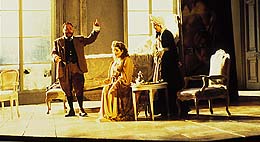
As Ochs (left) with Renée Fleming and Susanne
Mentzer in Houston
BD: Maybe sing the "Farewell" on a few concerts first to
see
how it goes.
EH: Oh to have a few concert opportunities. Presently
there
aren't that many. The business is leaning more towards opera. Without a
big recording career - which I have not had launched as yet - there is
not a lot of demand. It's all about marketing and advertising.
BD: Well, how can you be sure to keep the artistry among
the
marketing and P.R.?
EH: That's an interesting question and you might pose it
to
some of the singers who are "chosen." It's a mystery to me how that
happens.
I have seen some rise up in a flame of glory and then burn out. It's
unfortunate
that they get pushed much too hard by the recording industry and then
get
more demands for live concerts and so on. In the last few years, it
seems
to be happening to younger and younger artists as the marketing systems
seems to choose the cult of young. And it helps if they are photogenic.
One has to worry that individuals take care along the way.
BD: Well, what advice do you have for audiences who come
to
hear names they know well from recordings, and then also hear names
that
are much less familiar?
EH: To be cynical about it, the audience must try to
resist
marketing and advertising. Seriously, you've got to go and hear live
performances.
Get away from your stereo sets. Put your CDs away. Go to the live
theater where there is no microphone nor voice-enhancement system. You
must understand that a live performance involves a lot of peculiar
idiosyncrasies
of that particular time. It's a moment of history that is absolutely
unrepeatable.
Going into a theater should be like going into a church - you're going
to honor the artform and participate with the performer in an exchange
of energy. It's as important to the performer to have your presence
there
as vice versa. You will be enlivened by something. Sometimes it will be
imperfect, but that's the nature of the processes of life. A live
performance
hasn't been edited in a room with computers and sound boards. In a
concert,
the oboe soloist doesn't step out of the orchestra and into your living
room to play right in your ear, and then move back. In my opinion,
recordings
have gone overboard in being over-produced, and I hope we can cycle
back
around toward the notion of recordings sounding more like live theater.
The listener should have an idea of what the music sounds like in a
very
good room with a bit of reverberation of the voice that's designed to
be
heard in an acoustic situation, not as though your ear was next to the
microphone less than a foot from their mouth. As I said earlier, I use
the acoustics to my advantage and work with the sound in the hall. I
don't
want someone right next to me listening from one foot away. I boom out
a wide sound that goes out of my chest like a blanket and fills up the
auditorium, and the desired effect isn't really achieved until it's way
out in the middle of the space somewhere.
BD: So you plant it in row Z rather than in row B.
EH: Exactly. And it mixes with the sound from the
orchestra
which is out some distance from the stage.
BD: Your voice is particularly large, and seems, in fact,
to be larger than the others on the stage.
EH: That's one reason I'm particularly sensitive to the
recording
industry which seems to strive for the driest possible sound with
absolutely
no reverberation at all. To the engineers, that's distortion, and I
have
to quarrel with guys who use oscilloscopes and graphs and flow charts
to
evaluate artistic sound.
* *
*
* *
BD: I often ask about the purpose of opera, so let me ask
you that and follow it with how that purpose is changing through the
years.
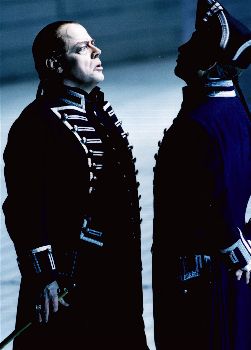 EH:
The purpose of opera is what it always was - a form of theatrical
entertainment
that ultimately combines several art forms into one. It hasn't changed,
but it's getting more complicated as we do modern pieces with modern
instrumentation
and even electronic music. We do multimedia presentations that involve
even more art forms all together in one statement. Opera is an art form
that is alive and well and thriving and growing. It continues to
exist, and as it changes, the type of singing that I do (acoustic as
opposed
to electronic) can become problematic particularly when it combines, in
the same performance, elements that are strictly acoustical and
elements
that are magnified electronically. It usually doesn't work very well
unless
you take the time to work out balances. I'm amazed at what seems
to be sort of a naïve attitude on the part of managements and
companies
about doing new composers' works that involve this problem. They should
work from the very beginning to try and solve to the composers'
satisfaction
the right balance of recorded sound portion vs. the acoustical
component.
I was involved in a Tosca on the West Coast - a vintage
Ponnelle
production where the audience is actually looking at the back of an
altar
that's on the front of the stage so you saw the chapel on into the
stage.
In the Te Deum that ended the first act, the chorus was rather
far
up into the stage, and they weren't projecting as well as the conductor
wanted, so he had them amplified along with the gigantically amplified
pretend pipe organ. There were three or four speakers hanging in the
air
way upstage and each was as big as two refrigerators together. There
were
also sound effects of cannons as well. Three huge elements, all
amplified,
and the Scarpia was down on the front of the stage without any
microphone
opening his mouth in time to the music. I'm afraid that was not
successful.
There are increasing technological problems to be overcome. If a person
wants to write an acoustical form of music to be sung in a classical
manner
by voices which are trained and designed to be heard without
microphones,
they should leave it that way.
EH:
The purpose of opera is what it always was - a form of theatrical
entertainment
that ultimately combines several art forms into one. It hasn't changed,
but it's getting more complicated as we do modern pieces with modern
instrumentation
and even electronic music. We do multimedia presentations that involve
even more art forms all together in one statement. Opera is an art form
that is alive and well and thriving and growing. It continues to
exist, and as it changes, the type of singing that I do (acoustic as
opposed
to electronic) can become problematic particularly when it combines, in
the same performance, elements that are strictly acoustical and
elements
that are magnified electronically. It usually doesn't work very well
unless
you take the time to work out balances. I'm amazed at what seems
to be sort of a naïve attitude on the part of managements and
companies
about doing new composers' works that involve this problem. They should
work from the very beginning to try and solve to the composers'
satisfaction
the right balance of recorded sound portion vs. the acoustical
component.
I was involved in a Tosca on the West Coast - a vintage
Ponnelle
production where the audience is actually looking at the back of an
altar
that's on the front of the stage so you saw the chapel on into the
stage.
In the Te Deum that ended the first act, the chorus was rather
far
up into the stage, and they weren't projecting as well as the conductor
wanted, so he had them amplified along with the gigantically amplified
pretend pipe organ. There were three or four speakers hanging in the
air
way upstage and each was as big as two refrigerators together. There
were
also sound effects of cannons as well. Three huge elements, all
amplified,
and the Scarpia was down on the front of the stage without any
microphone
opening his mouth in time to the music. I'm afraid that was not
successful.
There are increasing technological problems to be overcome. If a person
wants to write an acoustical form of music to be sung in a classical
manner
by voices which are trained and designed to be heard without
microphones,
they should leave it that way.
BD: Well, are you optimistic about the whole future of
opera?
EH: Oh very much so. There's a lot of exciting things
going
on. There's a lot of opera in this country. We need continued support.
I'm concerned about the general political trend that denigrates the
whole
notion of a National Endowment for the Arts.
BD: Is the performance practice that you aspire to for
everyone?
EH: I don't say that, by no means. It shouldn't be
expected
to be. However, the nature of culture needs to be supported. The nature
of artistic expression in various different means needs to be supported
outside of the necessities of the marketing system. I feel, in fact,
that
we're in trouble in this country as it's harder and harder for pure
arts
to exist. Arts that we are fed are generally tightly controlled and
watered-down
and simplified by the exigencies of the marketing and advertising
industry.
Why do we give all of our power away to those people who say, "Gee,
we'll
never lose our core audience, but we're really concerned about building
new audience." You see this in radio - so as not to alienate the
truckers
driving into town, stations limit classical singing to five minutes per
week, and that in the off hours. I've heard people say that there are
studies
to that effect. Here in Chicago, we're spoiled with the two stations
that
broadcast full operas and many vocal excerpts throughout the schedule.
There are many other cities which are hurting - particularly New York
City
right now. I think it's a scandal. If I may stay on my soap box a bit
more,
the United States really should feel itself connected to the rich
European
history of the arts. We should not neglect our combined cultural ethnic
histories, and that's a problem with the educational system right now.
It's extremely important if we're to remain at least conversant with
the
rest of the people on this planet who are still deeply immersed in a
cultural
attitude that can encompass knowledge of philosophical and artistic
history
as well as the latest fashion-fad of how to make still a new noise out
of an electric guitar. We've got to fight against that someway. I
almost
feel that this culture is too drawn into its narcissistic pursuit of
how
to spend the next dollar that it makes. We're actually in some trouble.
We're developing some oddly based class structure culturally and
artistically
as well as economically that doesn't bode well for the democratic
process.
Then I observe the advertising process which is becoming more and more
simplistic and almost insulting to the intelligent person's
observations.
BD: So how should opera be marketed?
EH: I think it should be made available to everyone and
that
the educational system in this country needs to be supported so that
people
are aware of what opera is. I had a cab driver in New York who asked if
I was a singer, where was my band? How could I sing without a
microphone?
He didn't have the slightest notion of what I was talking about. He'd
never
experienced it.
BD: Ignoring the range difference, couldn't you have said,
"Like Pavarotti"?
EH: Pavarotti has actually made himself useful to the
culture
to have become as famous as he has. But there is so much about him that
doesn't pertain to the rest of us or to the totality of the art form.
I'm
not saying that everyone should be able to go to Rigoletto and
be
able to hum the tunes on the way out, but there are times there to be
remembered.
BD: Would it be feasible for you and two other basses to
sing
in Dodger Stadium as "The Three Basses?"
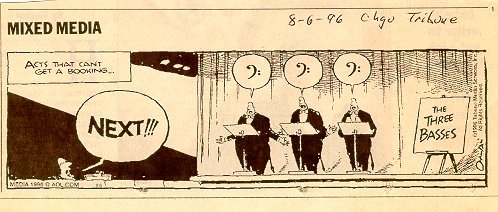
(As noted above, this interview took place in 1995!)
EH: I've often felt that some of us should get together
and
provide some sort of answer to the overwhelming wave of power that is
projected
by those three guys. I'm not sure what we could do, but we'd have a lot
of fun trying.
* *
*
* *
BD: Are you at the point in your career that you expect to
be at this age?
EH: Yes. I think so. Since I'm now singing the Ring
at Bayreuth, that's a very prestigious position to be in.
BD: Do you like having the roar of the orchestra come up
at
you from under that hood?
EH: Oh it's fantastic, and it's not so intimidating as you
might think. That's a good lesson in acoustics for everybody about when
in the distance from the stage to listen to the sound: after it's all
mixed
together. I don't understand why anyone would want to sit in the front
row of any theater. They spend a lot of money to sit there and I'm
delighted
that they do, but the best sound is it little farther back after the
mixing
has occurred. I also sat in the audience at Bayreuth and it's a softer
textured sound than you might think. We've gotten used to hearing
rather
hard-edged brassy sounds in some of the halls in this country, and the
orchestras play with an incredibly aggressive and powerful sound.
Although,
that has its effect and one likes it in certain pieces actually.
 BD:
Are you more careful with your diction or stage presence in Bayreuth
where
the entire audience knows every note and word - perhaps even better
than
you do?
BD:
Are you more careful with your diction or stage presence in Bayreuth
where
the entire audience knows every note and word - perhaps even better
than
you do?
EH: It's a little intimidating, I must say, and I've
worked
very hard for many years to speak German. But yes, you have to work
extremely
carefully. The long rehearsal process includes people who observe and
whose
sole job is to catch you on your diction. It's been quite an education.
BD: What advice do you have for the young singer coming
along?
EH: Be patient; don't go too fast; don't let the industry
pick you up and push you too fast. Grow up slowly if you can -
particularly
the lower and more dramatic voices, big mezzos and contraltos as well
as
heavyweight tenors and baritones.
BD: Does it take a bass to teach a bass?
EH: No, not at all. As it happened, I studied with Mark
Allen,
a bass at the U of I in the early '70s, and later went to Cologne to
take
a "fest" contract in the same house and same "fach" as he had done in
the
'60s. For a long time I didn't study with anyone and learned to rely on
myself. Nowadays, I go to a friend of mine who happens to be a tenor to
have a checkup once in awhile. It can be helpful for some things to
study
with the same voice type, but there can also be a problem if there's
too
much imitation, so it might be advisable to go even to the opposite sex.
BD: Perhaps have one teacher for technique and another for
repertoire?
EH: It's helpful to get a different perspective, but
there's
also something to be said for loyalty and sticking with a good thing. I
also would encourage young singers to become independent. I've observed
in institutions all over the world that some promote a kind of attitude
in young singers that causes them to be insecure, and they become quite
dependent and can hardly make any gesture on the stage vocally or
dramatically
unless they run to their teacher and see if it's OK. But when you get
out
into a job situation, and you get a little cold or a cough, or if
you're
particularly tired, or if the theater is being reconstructed around you
as you work and there's a lot of very fine construction dust and
powerfully
heated hallways because of the cold air outside, you better know what
to
do for yourself and know how to get out of trouble if you get into it.
BD: I've always felt the best teachers are the ones who
make
themselves become superfluous.
EH: Yeah.
BD: What advice do you have for composers who want to
write
music for the voice these days?
EH: It would be nice for them to get away from the text
books
that give graphic illustrations of what the voice ranges are supposed
to
be, and understand something, about the notion of tessitura.
BD: You don't want to be treated like a bassoon?
EH: I've been presented with scores by eager young
musicians
where the notes are all below the staff accompanied by bassoons and
cellos.
They have no concept whatsoever of sound-in-space. They don't know what
the sound is of a bass voice projecting a low C, and what the effect is
in a space. Granted, there is a great deal to be explored and it
depends
on what their aesthetic choices are. But in those cases, I asked them
to
seek a different singer.
BD: One last question - is singing fun?
EH: Absolutely. Sometimes, it's better than sex. When an
opera
singer goes up for a big climactic phrase with a humongous kind of
olympic
energy of the body being projected strictly through the voice, when the
top note comes out perfectly, we have a feeling of supreme ecstasy.
= = = = =
- - - - - - -
= = = = =
Costumed-photos (unlabeled) are Halfvarson as the Grand
Inquisitor
in Don Carlo, Claggart in Billy Budd, and Hagen at
Bayreuth.
Bruce Duffie is beginning his 22nd year as announcer/producer
with
WNIB, Classical 97 in Chicago, one of the very few stations in the US
that
still presents complete performances of new operatic recordings each
week.
His interviews are usually featured along with the CDs.
* * * * * * * * * * * * * * * * * * * * * * * * * * * * * * * *
|
Here are a few of the recordings which feature Eric Halfvarson . . . . .
|
© 1995 Bruce Duffie
This conversation was recorded in Chicago on February 16,
1995. Portions were broadcast on WNIB in 1997 and 1998.
This transcription was made in 1996, and published in The Opera Journal in September of
that year. It was later posted on this
website, with additional material added in 2016.
To see a full list (with links) of interviews which have been
transcribed and posted on this website, click here.
Award
- winning
broadcaster
Bruce Duffie was with WNIB, Classical 97 in Chicago from 1975
until
its final moment as a classical station in February of 2001. His
interviews have also appeared in various magazines and journals since
1980,
and he now continues his broadcast series on WNUR-FM, as well
as
on Contemporary Classical Internet Radio.
You are invited to visit his website
for more information about his work, including selected transcripts of
other interviews, plus a full list of his guests. He would also
like
to call your attention to the photos and information about his
grandfather, who was a pioneer in the automotive field more than a
century ago. You may also send him E-Mail
with comments, questions and suggestions.
 Besides
the many operas, Halfvarson makes time each season for some concerts
including
the Missa Solemnis and Ninth Symphony of Beethoven, the
C
Minor Mass of Mozart, and recently the Mahler
8th with the Chicago
Symphony Orchestra. He returns to the Windy City in September for the
Opening
Night Don Carlo.
Besides
the many operas, Halfvarson makes time each season for some concerts
including
the Missa Solemnis and Ninth Symphony of Beethoven, the
C
Minor Mass of Mozart, and recently the Mahler
8th with the Chicago
Symphony Orchestra. He returns to the Windy City in September for the
Opening
Night Don Carlo.
 EH:
There's something about the character of a personality that goes
(usually)
right along appropriately with the voice-type. I enjoy being fathers
and
priests and bad guys, and occasionally funny guys. In my younger days,
I did Mozart's Figaro a lot, and that's the only one I can think of
offhand
where the bass actually does get the girl. Nowadays I've been doing an
awful lot of bad guys, particularly in Bayreuth where I do Hagen. He's
one of my favorites because I get to kill both the tenor and the
baritone!
I feel a certain justice in that one. But it's been a great deal of fun
to go back to my old friend Don Basilio here in Chicago. I hadn't sung
him since '87, and I'm having a glorious time being very silly on the
great
stage.
EH:
There's something about the character of a personality that goes
(usually)
right along appropriately with the voice-type. I enjoy being fathers
and
priests and bad guys, and occasionally funny guys. In my younger days,
I did Mozart's Figaro a lot, and that's the only one I can think of
offhand
where the bass actually does get the girl. Nowadays I've been doing an
awful lot of bad guys, particularly in Bayreuth where I do Hagen. He's
one of my favorites because I get to kill both the tenor and the
baritone!
I feel a certain justice in that one. But it's been a great deal of fun
to go back to my old friend Don Basilio here in Chicago. I hadn't sung
him since '87, and I'm having a glorious time being very silly on the
great
stage.



 EH:
The purpose of opera is what it always was - a form of theatrical
entertainment
that ultimately combines several art forms into one. It hasn't changed,
but it's getting more complicated as we do modern pieces with modern
instrumentation
and even electronic music. We do multimedia presentations that involve
even more art forms all together in one statement. Opera is an art form
that is alive and well and thriving and growing. It continues to
exist, and as it changes, the type of singing that I do (acoustic as
opposed
to electronic) can become problematic particularly when it combines, in
the same performance, elements that are strictly acoustical and
elements
that are magnified electronically. It usually doesn't work very well
unless
you take the time to work out balances. I'm amazed at what seems
to be sort of a naïve attitude on the part of managements and
companies
about doing new composers' works that involve this problem. They should
work from the very beginning to try and solve to the composers'
satisfaction
the right balance of recorded sound portion vs. the acoustical
component.
I was involved in a Tosca on the West Coast - a vintage
Ponnelle
production where the audience is actually looking at the back of an
altar
that's on the front of the stage so you saw the chapel on into the
stage.
In the Te Deum that ended the first act, the chorus was rather
far
up into the stage, and they weren't projecting as well as the conductor
wanted, so he had them amplified along with the gigantically amplified
pretend pipe organ. There were three or four speakers hanging in the
air
way upstage and each was as big as two refrigerators together. There
were
also sound effects of cannons as well. Three huge elements, all
amplified,
and the Scarpia was down on the front of the stage without any
microphone
opening his mouth in time to the music. I'm afraid that was not
successful.
There are increasing technological problems to be overcome. If a person
wants to write an acoustical form of music to be sung in a classical
manner
by voices which are trained and designed to be heard without
microphones,
they should leave it that way.
EH:
The purpose of opera is what it always was - a form of theatrical
entertainment
that ultimately combines several art forms into one. It hasn't changed,
but it's getting more complicated as we do modern pieces with modern
instrumentation
and even electronic music. We do multimedia presentations that involve
even more art forms all together in one statement. Opera is an art form
that is alive and well and thriving and growing. It continues to
exist, and as it changes, the type of singing that I do (acoustic as
opposed
to electronic) can become problematic particularly when it combines, in
the same performance, elements that are strictly acoustical and
elements
that are magnified electronically. It usually doesn't work very well
unless
you take the time to work out balances. I'm amazed at what seems
to be sort of a naïve attitude on the part of managements and
companies
about doing new composers' works that involve this problem. They should
work from the very beginning to try and solve to the composers'
satisfaction
the right balance of recorded sound portion vs. the acoustical
component.
I was involved in a Tosca on the West Coast - a vintage
Ponnelle
production where the audience is actually looking at the back of an
altar
that's on the front of the stage so you saw the chapel on into the
stage.
In the Te Deum that ended the first act, the chorus was rather
far
up into the stage, and they weren't projecting as well as the conductor
wanted, so he had them amplified along with the gigantically amplified
pretend pipe organ. There were three or four speakers hanging in the
air
way upstage and each was as big as two refrigerators together. There
were
also sound effects of cannons as well. Three huge elements, all
amplified,
and the Scarpia was down on the front of the stage without any
microphone
opening his mouth in time to the music. I'm afraid that was not
successful.
There are increasing technological problems to be overcome. If a person
wants to write an acoustical form of music to be sung in a classical
manner
by voices which are trained and designed to be heard without
microphones,
they should leave it that way.

 BD:
Are you more careful with your diction or stage presence in Bayreuth
where
the entire audience knows every note and word - perhaps even better
than
you do?
BD:
Are you more careful with your diction or stage presence in Bayreuth
where
the entire audience knows every note and word - perhaps even better
than
you do?
